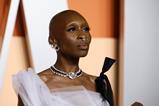Apple’s latest advert sees Mother Nature assessing the tech giant’s green credentials. But Apple would never dare depict Christian faith, says Kate Orson. Why are they willing to dabble with paganism?

At the recent unveiling of the new Apple iPhone 15, the company shared a promotional video in which ‘Mother Nature’, played by Octavia Spencer, drops in for a meeting.
As a diverse collection of male and female executives boast of everything Apple is doing to protect the planet - from carbon neutral products to restoring Kenyan grasslands - she sits at the head of the table, occasionally threatening judgement unless the tech giant ups its game.
Despite the underlying message that Apple intends to be a carbon neutral company by 2030, the ad has not been universally welcomed. Some have argued it misrepresents the gender and ethic makeup of Apple’s actual boardroom. Others say the humour misses the mark. For Christians, its the pagan undertones that are most worrying.
Spiritual, but not religious
I spent years in the new age movement beofre converting to Christianity two years ago.
Contrary to what many think, society is becoming more interested in spiritual things. The most recent census shows the number of pagans in the UK has doubled since 2011, and this looks set to increase over the next ten years. A similar trend is taking place in the US. And these numbers don’t include the vast number of people who wouldn’t call themselves pagan, but still dabble in new age practises.
It would be unthinkable for a secular company to make an overtly religious advert for their product, so why did Apple think that a pagan one would be OK?
I suspect that it could be the way in which new age beliefs are presented within our culture.
People might do a bit of yoga without calling themselves Hindu, or practice mindfulness without feeling that it is tied to any spiritual belief system. They might celebrate the solstice or take part in a new moon ritual, visit a psychic or do some breathwork. It is a pick and mix of different practices to suit all tastes. People define themselves as ‘spiritual, but not religious’, dipping in and out without commitment, or a label.
The times are changing
Society is changing, and holding Christian beliefs is becoming less and less acceptable. Pro-life campaigners have been arrested for praying outside abortion centres, street preachers have been arrested for hate speech and a vicar who criticised a building society’s stance on trans issues had his account closed.
It would be unthinkable for a secular company to make an overtly Christian advert. Why is a pagan one acceptable?
Meanwhile, pagan slogans are displayed everywhere from adverts to notebooks and mugs. We are encouraged to “reach for the stars” and “shine like the sun”. Bookshop windows are filled with titles - assumed to be harmless - about witchcraft and manifesting.
The Chatham House think tank recently created a ‘futurescape,’ an interactive digital exploration of what London might look like in the next 100 years. In the presentation, a new religion called ‘Earthism’ is imagined that appears to fit perfectly with a green-focused future and our innate need to worship something. In a post-atheist, spiritual society, belief becomes a simple matter of choice. What fits with my identity?
Standing for the truth
By producing this advert, Apple have alienated their Christian, Jewish and Muslim employees (and customers). The diverse boardroom portrayed in the film is a fiction. In reality, it is still heavily dominated by white males. Apple has also been accused of having slavery in their supply chain. Most of their products are made in China, which has one of the worst environmental records in the world.
The Apple advert is another example of the ‘false light’ shining brighter. For Christians, our job should be to expose the lies. Without Jesus there can only be darkness.
“And those who are wise shall shine like the brightness of the sky above; and those who turn many to righteousness, like the stars forever and ever” (Daniel 12:3).






































3 Readers' comments